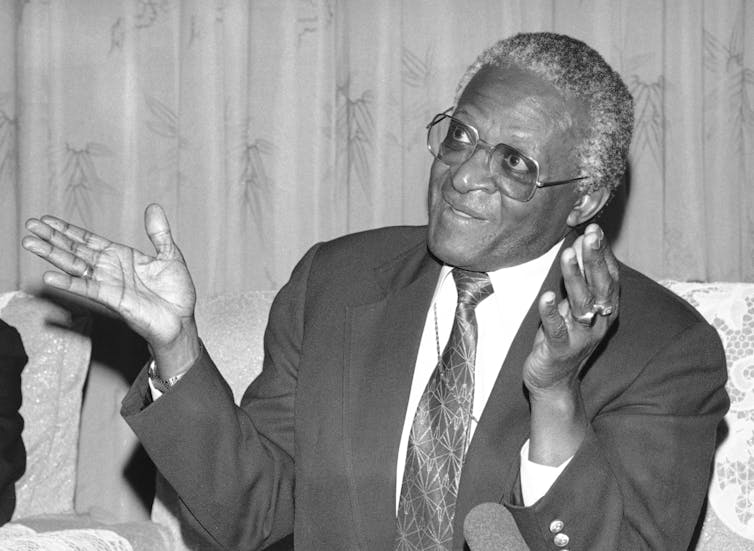
AP Photo/Evan Vucci
Joanne M. Pierce, College of the Holy Cross
Episcopal Bishop Mariann Edgar Budde’s sermon on Jan. 21, 2025, in which she appealed to President Donald Trump to have mercy toward groups frightened by his position on immigrants and LGBTQ+ people – especially children – drew reactions from both sides of the aisle.
In a post on his social networking site, Truth Social, Trump called her comments “nasty in tone” and remarked that she “brought her church into the World of politics in a very ungracious way.”
“She and her church owe the public an apology!,” he posted. Several conservatives criticized her sermon, while many progressives saw her as “speaking truth to power.”
As a specialist in medieval Christianity, I was not surprised by the bishop’s words, as I know that Christian history is full of examples of people who have spoken out, unafraid to risk official censure, or even death.
Early voices
Even in the early centuries of Christianity, followers of Jesus Christ’s teachings could be outspoken toward political leaders.
For example, in the first-century Gospels, John the Baptist, a contemporary of Jesus, confronts the ruler of Galilee, Herod Antipas, for marrying his brother’s wife – a practice forbidden in the Hebrew scriptures. For that, John the Baptist was ultimately beheaded.
In a prayer later called the Magnificat, Mary, the mother of Jesus, praises the glory and power of God who casts down the mighty and raises the lowly. In recent interpretations, these words have been understood as a call for those in authority to act more justly.
In the late fourth century – a time when Christianity had been made the official religion of the Roman Empire – a respected civil official named Ambrose became bishop of the imperial city of Milan in northern Italy. He became well known for his preaching and theological treatises.
However, after imperial troops massacred innocent civilians in the Greek city of Thessaloniki, Ambrose reproached Emperor Theodosius and refused to admit him to church for worship until he did public penance for their deaths.
Ambrose’s writings on scripture and heresy, as well as his hymns, had a profound influence on Western Christian theology; since his death, he has been venerated as a saint.
In the early sixth century, the Christian Roman senator and philosopher Boethius served as an official in the Roman court of the Germanic king of Italy, Theodoric. A respected figure for his learning and personal integrity, Boethius was imprisoned on false charges after defending others from accusations by corrupt court officials acting out of greed or ambition.
During his time in prison, he wrote a philosophical volume about the nature of what is true good – “On the Consolation of Philosophy” – that is studied even today. Boethius, who was executed in 524, is venerated as a saint and martyr in parts of Italy.
Thomas Becket and St. Catherine
One of the most famous examples of a medieval bishop speaking truth to power is that of Thomas Becket, former chancellor – that is, senior minister – of England in the 12th century. On becoming archbishop of Canterbury, Becket resigned his secular office and opposed the efforts of King Henry II to bring the church under royal control.

Dukas/Universal Images Group via Getty Images
After living in exile in France for a time, Becket returned to England and was assassinated by some of Henry’s knights. The king later did public penance for this at Becket’s tomb in Canterbury. Soon after, Becket was canonized a saint.
Another influential saint was the 14th-century Italian mystic and writer Catherine of Siena. Because of the increasing power of the kings of France, the popes had moved their residence and offices from Rome to Avignon, on the French border. They remained there for most of the century, even though this Avignon papacy increased tensions in western Europee.
Many Christian clerics and secular rulers in western Europe believed that the popes needed to return to Rome, to distance papal authority from French influence. Catherine herself even traveled to Avignon and stayed there for months, writing letters urging Pope Gregory XI to return to Rome and restore peace to Italy and the church – a goal the pope finally fulfilled in 1377.
Leaders speak up across denominations
The Reformation era of the 16th and early 17th centuries led to the splitting of Western Christianity into several different denominations. However, many Christian leaders across denominations continued to raise their voices for justice.
One important and ongoing voice is that of the Religious Society of Friends, or Quakers. Early leaders, like Margaret Fell and George Fox, wrote letters to King Charles II of England in the mid-17th century, defending their beliefs, including pacifism, in the face of persecution.
In the 18th century, based on their belief in the equality of all human beings, Quaker leaders spoke in favor of the abolition of slavery in both the United Kingdom and the United States.
In fact, it was Bayard Rustin, a Black Quaker, who coined the phrase “to speak truth to power” in the mid-20th century. He adhered to the Quaker commitment to nonviolence in social activism and was active for decades in the American Civil Rights Movement. During the Montgomery bus boycott in the mid-1950s, he met and began working with Martin Luther King Jr., who was an ordained Baptist minister.
In Germany, leaders from various Christian denominations have also united to speak truth to power. During the rise of the Nazis in the 1930s, several pastors and theologians joined forces to resist the influence of Nazi doctrine over German Protestant churches.
Their statement, the Barmen Declaration, emphasized that Christians were answerable to God, not the state. These leaders – the Confessing Church – continued to resist Nazi attempts to create a German Church.
Desmond Tutu and other leaders

AP Photo/Jim Abrams
Christians on other continents, too, continued this vocal tradition. Óscar Romero, the Roman Catholic archbishop of San Salvador, preached radio sermons criticizing the government and army for violence and oppression of the poor in El Salvador during a national civil war. As a result, he was assassinated while celebrating Mass in 1980. Romero was canonized a saint by Pope Francis in 2018.
In South Africa, the Anglican bishop Desmond Tutu, archbishop of Cape Town, spent much of his active ministry condemning the violence of apartheid in his native country. After the end of the apartheid regime, Tutu also served as chair of the Truth and Reconciliation Commission, which was established to investigate acts of violence committed both by government forces and violent activists. Before his death in 2021, Tutu continued to speak out against other international acts of oppression. He won the Nobel Peace Prize in 1984.
For some, Bishop Budde’s words might seem radical, rude, inappropriate or offensive. But she did not speak in isolation; she is surrounded by a cloud of witnesses in the Christian tradition of speaking truth to power.![]()
Joanne M. Pierce, Professor Emerita of Religious Studies, College of the Holy Cross
This article is republished from The Conversation under a Creative Commons license. Read the original article.




























































